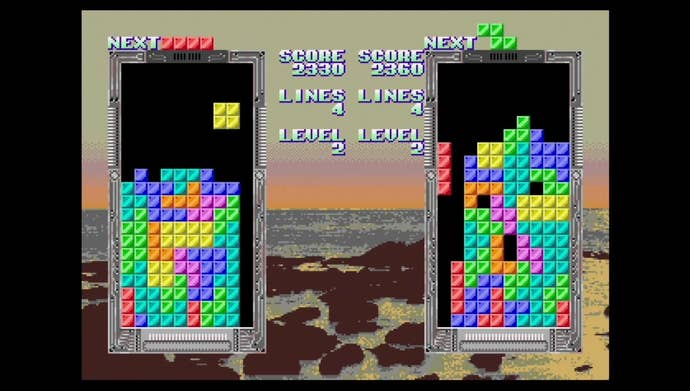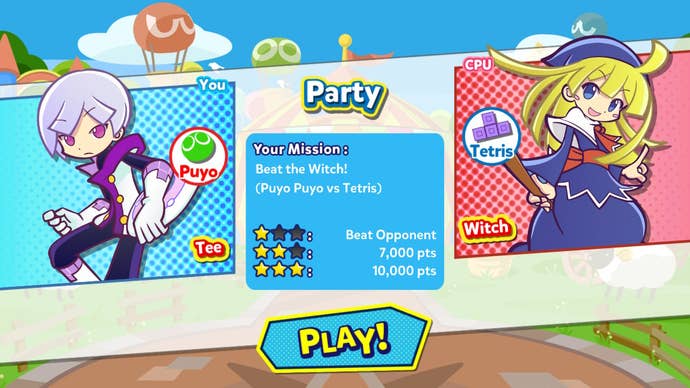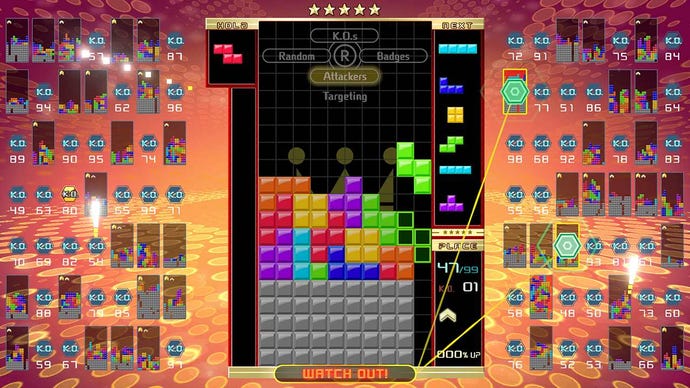Tetris 99's Biggest Fan Is The Father of Tetris Himself, Alexey Pajitnov
Tetris' creator is excited to see his game flourish as a competitive experience.
This article first appeared on USgamer, a partner publication of VG247. Some content, such as this article, has been migrated to VG247 for posterity after USgamer's closure - but it has not been edited or further vetted by the VG247 team.
If not for Tetris, I probably never would have owned a Game Boy. When Alexey Pajitnov's phenomenally popular block-matching puzzle game paired up with Nintendo's portable game system in 1989, my mother suddenly found a reason to buy my brothers and I a Game Boy. In retrospect, I owe Tetris a lot.
Some people owe Tetris far more than I do. Studies suggest that playing Tetris might help alleviate post-traumatic stress disorder. Another study discovered playing a modified version of Tetris might help individuals treat lazy eye.
Tetris is also just helpful for managing stress in any situation. Stacking blocks in neat rows appeals to our drive to "tidy up" and bring order to chaos, and the simple conditions for winning lets our thoughts wander while we play. Anyone can appreciate Tetris regardless of their age, gender, or level familiarity with video games. That's why literally every child and grandmother recognizes Tetris the minute they see those iconic geometric blocks—"tetrominoes"—drift from the top of a screen.
Tetris' westward trek from a simple game programmed by Pajitnov on a Soviet-era Electronika 60 computer to a cultural icon is fascinating and wrought with government drama and copyright scandal. You can find a simplified timeline of events on the official Tetris homepage, and there are several books, documentaries, and articles that go in-depth on Tetris' North American homecoming.
In other words, a not-small part of Pajitnov's existence has been eventful. But for someone who's lived part of his life in the center of a maelstrom that eventually settled to become one of the most popular video games of all time, Pajitnov is calm and cheerful. He's also humble about everything Tetris has accomplished and has ambitious ideas for how he'd like it to evolve.
"I'm really proud Tetris has given people so many hours of happiness. It's a good feeling for me," he tells me over Skype. "I think all games are a good forum for mental health, and Tetris is no exception. Games are a rare, intellectual, active kind of entertainment. Usually when you crave intellectual entertainment, you just sit on your couch and watch TV or read a book."
Pajitnov is still involved with Tetris through The Tetris Company, a 2005 LLC that licenses the brand to third parties. These third-party projects help preserve Tetris as much as they help innovate on it. In the past few years alone, we received the adorable Puyo Puyo Tetris mash-up, soared along with the award-winning Tetris Effect, struggled for supremacy against other players in Tetris 99, and even got our hands on a previously unpublished version of Tetris through the Sega Genesis Mini. Not even Pajitnov can keep up with everything; he was genuinely surprised when I told him about the lost edition of Tetris that hit the Genesis Mini.
"Interesting," he says. "I'll check it out."

That's not to suggest Pajitnov isn't tuned in to what's going on in his Tetris kingdom. We discussed some of the newer games, and Tetris' continued potential as a competitive pastime, a door that opened with last year's Tetris 99 for the Switch.
"I love Switch. They [Nintendo] did a great job on it," Pajitnov says, citing The Legend of Zelda: Breath of the Wild as one of his favorite games on the system and lamenting how his son keeps stealing it away from him. But Tetris 99 is the game he's most excited about, since that's where he sees the franchise's future.
"Tetris 99 is absolutely a great title," he says. "Basically, I think the one-player version of Tetris has been more or less stabilized over the years. That's good, and we're just adjusting the game to new user interfaces. But for two-player modes and serious competition, there are several challenges to overcome.
"I really want Tetris to establish itself as an esport. We're getting there very slowly but surely."
While Pajitnov isn't quite as over-the-moon about Tetris Effect, he's still very impressed by its ethereal graphics. He also likes Puyo Puyo Tetris quite a bit, calling Puyo Puyo "the only game that could pair with Tetris." Then he surprised me by revealing he had a hand in bringing the original Puyo Puyo puzzle game to life. "I designed the puzzle mode—the small tasks, like when you need to clear the field in a couple of moves or something like that. But it was so long ago, maybe 20 years. I can't remember."
The first Puyo Puyo game was developed for Japan's MSX2 computer and the Famicom Disk System by the now-defunct Compile in 1991, making Pajitnov's estimate closer to 30 years ago. What's a decade here or there, though?

The future of Tetris looks energetic and surprisingly diverse, but Pajitnov is careful not to constantly operate at a "level nine, high five" pace. He winds down by reading, watching television, and staying active. "I'm almost 65, so it's time for me to look after my health," he says. "I'm exercising a little bit, trying to keep myself in at least decent physical condition."
He's also working on games that don't involve spinning letter blocks. "I have a couple of slow projects I'm doing with my friends. I have two very old friends. They live in Saint Petersburg. About ten years ago, we started to produce some little puzzles for the App Store." He laughs. "We're still doing it, but it's kind of slow. There's only three of us."
Tetris has been synonymous with puzzle games since the end of the '80s, and Pajitnov's energy regarding its future signals Tetris will remain the genre's king for years to come. Will the new decade grant it a spot as a major contender as an esport? Given Tetris' brand power, the general public might finally react with something other than angry confusion when they turn on ESPN and see professional block-stackers struggling against each other.


